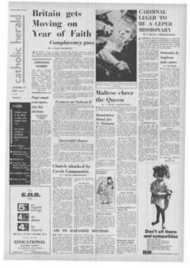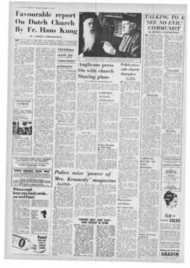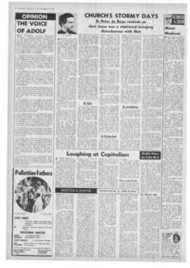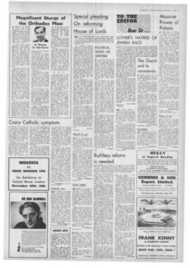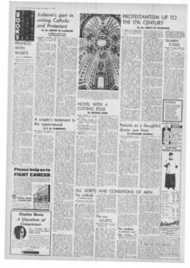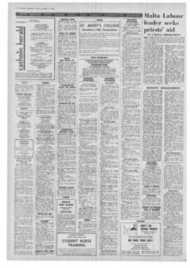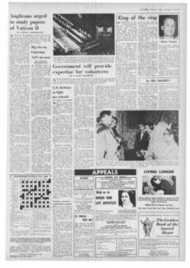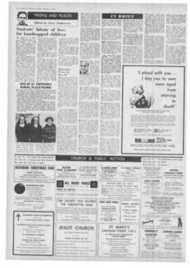Page 4, 17th November 1967
Page 4

Report an error
Noticed an error on this page?If you've noticed an error in this article please click here to report it.
Tags
Share
Related articles
De Rosa's Motion Picture Of The Deeply Human Jesus
Sir, — Fund-raising During The Last Two And A Half
`rfhere Is A Need For A Church Militant'
Who Judas Really Was
A Nasty Piece Of Work
CHURCH'S STORMY DAYS
Fr Peter de Rosa reminds us that Jesus was a whirlwind bringing disturbances with Him
ARECENT report on Ger man Protestantism in Herder Correspondence tells how the bishops were asked to condemn the more radical type of Bible scholars. They made a statement which began: "The present disputes about the Bible are to us a sign that the Church is alive. Where the Spirit of God is at work. there is disquiet."
No doubt, confronted with a similar issue we would have been tempted to say : "Where the Spirit of God is at work, there is (or should be) peace, harmony, unanimity, a strong and revered authority." We would hardly have singled out "disquiet" as one of the fruits of the Holy Ghost.
Bishop Trevor Huddleston has this story to tell. Some while ago, in a South African courtroom, an Anglican priest jumped up to plead the cause
of an accused South African Negro. The priest was told: "That is enough. You must sit down." When he refused, the magistrate had the courtroom cleared and the hearing adjourned. He said to the priest: "I am surprised at you, a min
ister of religion, causing a disturbance like this."
The clergyman and the Holy Spirit were hound over to keep the peace. Peace? said Jesus. I came to bring a sword not peace.
Jesus was no muzzled, respectable clergyman. He was a
whirlwind bringing a storm of disturbances. The priests of his time said : "This man is causing a disturbance among the people." They were right. Jesus was convincing the people that love is the only thing that matters : which doesn't please the lawyers. That mercy is more important than sacrifice: which doesn't please the priests. That the tag "Keep the rules and the rules will keep you" ;is false: which doesn't please the Pharisees.
"The Sabbath was made for man, not man for the Sabbath." The Pharisees couldn't believe their ears. Was not the sabbath of God's devising? A few contemporary substitutions will make Jesus' point plain. "Man was not made for the rules of religious life, divine
office, clerical celibacy, but all these things were made for man." Jesus was not attacking the Sabbath, any more than I am attacking religious rules, the divine office or clerical celibacy. He was simply saying man comes first.
Jesus told the disturbing story of the Pharisee who kept all the Law (with generous extras) and was not justified. The tax-collector kept none of the Law, only he was very, very sorry. To him the Lord said: "You're all right as far as I'm concerned."
The only thing is we mustn't use the publican's prayer as a kind of infallible technique to extort God's forgiveness. Sin is no more a "recommendation" than were the Pharisees' proud fasts and tithes. The artless humility of the repentant publican can very easily become the artful humility of the unrepentant Pharisee posing as a publican.
Jesus' friends were a constant source of disquiet to the respectable scribes and Pharisees. He went about with tax-collectors (a mixture of blackmarketeers and quislings working hand in hand with the Roman army of occupation). He was often in the company of prostitutes—not the longhaired, haloed, doleful Magdalens of traditional art, but blousy, raucous females of the streets. He let one such slobber embarrassingly over his feet. (We talk reverently of her "shedding tears over his feet.")
A sign
Jesus ate with tax-collectors and harlots. He wanted to share his life with them. The scribes and Pharisees got the point. The eating and drinking with sinners was a sign of Jesus's mission. He had nothing to give or share with "righteous" folk. How he slated them, the upholders of the status-quo.
Whitewashed tombs filled with dead men's bones, he called them. outwardly righteous and inside brimful of extortion and greed. They wiped the surfaces of cups and plates but left their own hearts fetid and unclean. Blind leaders of the blind, strapping bundles on other people's backs yet unwilling to lift a finger to help them carry them.
With broad phylacteries. long fringes: desirous of places of honour at feasts and the best seats in the synagogue. Such they were. They liked to hear: "How do you do, Rabbis," from the forelock
touching peasants. "You hypocrites," cried Jesus to the Pharisees, "shutting the door of the kingdom of heaven in men's faces. Running all over the world to make one convert and making him twice as much a child of hell as yourselves."
Their "morality" was immoral because they put first things Last and last things first. Law came before love—so far before, that love got lost. And Jesus, though he fumed at them like an Old Testament prophet fumed only to make them see that loves comes first. Even his prophetic fulminations are the expression of his -concern for those he castigates. They must be made to see the primary of God's love to which human love is but a partially faithful response.
Jesus attacks the very representatives of God, the Jewish hierarchy, for demanding blind obedience: for making it seem as if there is a kind of legal contract between men and God, instead of a grace-relationship, for lording it over those whom they ought, in their capacity as God's representa• tives, to have served.
He, Jesus, was the Servant. Hence this ruling of his which makes authority in the Church quite distinct from any other sort: "He who is greatest among you shall be your servant."
This is why the Jewish hierarchy could not recognise Jesus: he was so different from themselves. He was the servant of the poor, the meek, the sinner; they were the Tzars of Palestine.
The crisis of the gospels comes as Jesus realises (perhaps slowly and tragically) that he is going to be rejected. The storm clouds gathered and burst. On the cross his service was made perfect unto death.
Only the poor and humble can see this as the final exhibition of God's saving and serving love in the world. To the unbeliever the cross can reveal nothing of God, certainly not the fullness of God's love and glory. To the Jews it is a stumbling block, to the Gentiles folly, but to those who are called, Christ the power and the wisdom of God.
A firebrand
Paul wrote that. There was a firebrand of a man, someone ready to sow the wind and whip up the storm if need be. Paul loved peace; he constantly pleaded for unity; schism he detested more than
anything. Yet because he had the same priorities as his Lord and Master he constantly set the Church of his day running around in circles.
He stood up to Peter because Peter was in danger of going back on a previous decision and wanting to make Gentile converts into practising Jews first. "What are you trying to do?" Paul asks him. "Make us depend on taw not grace, on works not faith. on our own merits instead of Christ's cross? A Christian is a free man. Do you want to make a slave of him again?"
Paul says magnificently : "I opposed him to his face, because he stood condemned" (Gal. 2: I l), and Peter, the first Pope, climbed humbly down. What would have happened to the Church if Paul had not given him a long. cold look one day in Jerusalem? Would it not have been tied to the yoke of the Law for centuries afterwards? As it was, despite all the troubles and turmoils of the time, the Church broke out of the shell of Judaism to confront the world with the solitary and exhilarating scandal of the cross.
Have the stormy beginnings of the Church any lessons for us in our day? Surely. The storms are unabated. that's certain. The Spirit is still causing disquiet. After all, we did pray for him to come upon the Council ! But even bishops squabbling in public do not make so disquieting a scene as Peter and Paul squaring up to each other on an issue that puts birth-control in the shade.
A greatness
Can we be so sanguine? Are not priests giving up their ministry? Sisters leaving their convents like flocks of migrating birds? Lay people "going it alone"?
Well, things are not really so unlike the way they have always been. And the very freedom which makes abuses possible today makes a new kind of greatness possible, too. The Church's Declaration on Religiou, Freedom can be misunderstood but it has made everyone decisively aware of the significance of his Godgiven freedom. (Gandhi said that God in giving us liberty proved himself to be the greatest Democrat of all.)
A few will get puffed up with their own importance and run berserk; false prophets will arise frivolously clouting everything in sight and throwing smoke bombs and handgrenades in all directions. Many more will discover themselves for the first time.
The same liberty which enables a number of priests to relinquish the ministry will cause Protestants in Spain to be accorded full status as children of God for the first time. We shall all be made to see the true scandal of the cross: God will win us by his weakness or not at all. No force is permitted to propose a Gospel of Love. As Voltaire said. "Truth shines with its own light, and you cannot illuminate the mind by flames from the stake."
Further, it is worth remembering that those who abuse their liberty today are, for the most part, willing victims. In more conformist times the victims were just as numerous (maybe more so); and most often they were silent and unwilling. Conformity brings its own abuses. Conformity can crucify in secret places.
Jesus turned traditional religion inside out. as we have seen. It's a process that often needs repeating because we go on putting law before love. Take the once frequently voiced view that a superior in religion, because he stands in the place of Christ. can demand blind obedience
Surely a superior is in Christ's place in so far as he helps people to see: because he is the supreme servant of the community; because he represents the love and concern of Christ for everyone. The claim that a superior, as representing Christ, can always demand blind obedience constitutes one of the most astounding revolutions in the history of Christian thought.
J. N. Sanders wrote: "The attempt to produce conformity by coercion is the usurpation by men of a power which God has not only denied to them but renounced for himself."
Our age does not seem to be so remarkably unlike other ages. It would need evidence to which we have no access to prove that we are any better or any worse than our Christian forebears. The abysmal darkness is not necessarily, as some would have it, hovering about our heads.
The disciples saw Jesus crucified and they said : "This is the end." The first Jewish converts watched Paul baptising Gentiles without demanding circumcision and observance of the Law and they said: "This is the end." Today. people see old structures disintegrating, old forms of authority dissolving, and still the refrain is: "This is the end."
blog comments powered by Disqus


